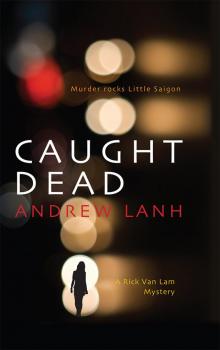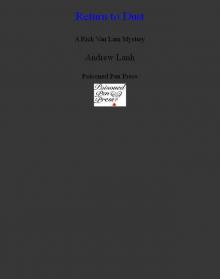- Home
- Andrew Lanh
No Good to Cry Page 3
No Good to Cry Read online
Page 3
Although at times, frustrated, I was tempted to do so.
I never did.
Or rarely.
Now, lying in the hospital bed, he looked so weak and vulnerable, a man who’d always struck me as steel and spit, leveled now, hooked to apparatus that mimicked his labored breathing. I’d never considered that he could be—hurt.
Gracie began sobbing, clutching Liz’s arm, her body sagging. And Liz, stepping close to the bed, reached out to touch his arm. She faced me, her eyes moist. “My God.”
I couldn’t move. The left side of his face was black-and-blue, a deep purple blotch on his temple. One arm, lying palm up, showed dark welts, pitch-black. His chin had red abrasions. A bandage covered his left ear. A foot in a cast. He looked—broken.
We stood there, silent, silent, nervous, not knowing what to do, until finally, stepping forward, I bent over him, my lips near his face. “Jimmy.” A flicker of the eyelids. I looked at Liz. “He can hear me.”
“Jimmy,” she echoed. “It’s Liz.”
“And Gracie.” My landlady’s voice arched over Liz’s, too loud for the room. Again, the flickering of the eyelids. Gracie bumped into the bedframe, tottered, and Liz grasped her elbow. She nearly toppled onto the bed, and a hand grazed Jimmy’s side. I swear he winced.
“Jimmy, can you hear me? It’s Rick.”
Nothing.
“We need to go,” Liz said finally.
But at that moment Jimmy flashed open his eyes, so rapid a movement that his eyes seemed to pop. His neck twitched. Gracie gasped. Suddenly his lips began to move slowly as he ran his tongue over them, like a thirsty man.
He said something.
“What?” From Gracie.
His lazy eyes slowly drifted from Liz to Gracie to me. A thin smile broke at the edges as he mumbled some words, groggy, slurred.
“I can’t understand you,” I said. “Tell me.”
Then, each word spaced out, a man in a blissful narcotic stupor, Jimmy said clearly, “I must of died and gone to hell ’cause I’m looking up at three damn fools.”
Chapter Three
The following afternoon, a Saturday, Hank knocked on my door. I’d been expecting him. Last night, leaving the hospital, I’d texted him back. We’d talked for a few minutes on the phone. Before bedtime, restless, as I stared at the TV screen and sipped lukewarm Chinese white lotus tea, I got a Facebook alert. Hank, ready for bed, wanted to know what I’d learned. His frenzied message was in block letters, an annoying affectation young folks use to suggest shouting. I don’t like being shouted at. However, it was Hank, and, frankly, friends have license others lack.
YOU DO KNOW THAT WE HAVE TO DO SOMETHING. THIS NEEDS LOOKING INTO.
Well, I’d learned nothing new since our earlier talk, but we chatted back and forth, thankfully using lower case alphabet. We did discuss Detective Ardolino’s role in the investigation, which intrigued him. Hank’s final comment before signing off: “Does he still love you to death?”
I smiled at that.
Now, wearing a faded UCONN sweatshirt and baggy khakis, he strode into my apartment, an expectant look on his face. I hadn’t seen him in some time, what with his intense training at the Connecticut State Police Academy, where he lived in the dorm during the weekdays. His boyhood dream of being a trooper was a month or so away, courses completed and the grueling physical training accomplished, the swearing-in ceremony at the State Armory something all of us looked forward to, though I knew his parents and grandma worried about a dangerous life spent in crime-infested neighborhoods.
Having been a cop myself, I tried to reassure his family, but I couldn’t convince myself. After all, I’d been a cop in New York’s Hell’s Kitchen where I’d blown away a piece of filth who’d just beat up some poor slob for a few dollars and then put a cocked gun to my own head.
I still had nightmares about that night. That trauma propelled me to leave the force—and my marriage. A desire for calm led me to a life in placid Farmington, Connecticut, where my only real danger resulted from painful paper cuts as I painstakingly skimmed through personnel and audit records at Aetna Insurance.
“You’ve buffed up,” I told Hank now.
He beamed. The physical rigors of training throughout the past year at the Academy had transformed the tall, slight Vietnamese boy who’d been a student of mine in a Criminology class at Farmington College. With his shaved head, his broad shoulders and wide chest, he was more competitive wrestler than the lithe young man I’d played tennis with. A handsome man with wide nut-brown eyes in narrow, slanted sockets, high cheekbones, and a rich mocha complexion, he was a charmer who bucked his family’s expectation that he wed a chosen Vietnamese girl—preferably some FOB, Fresh Off the Boat—and fashion a career in an office building in downtown Hartford. Computers, they suggested. The IT department at, say, Cigna.
Our friendship had a rocky beginning because he’d harbored pureblood Vietnamese bias against mixed-blood mongrels as myself, but his warm heart and keen intelligence had defeated such provincialism. These days he was my buddy, though largely an absent one. Before his days at the Academy, he’d been my tag-along companion as I did my meager fraud investigations, which he found more interesting than I did.
He walked to my refrigerator and took out a quart carton of orange juice, jiggled it, frowned, and then chugalugged the contents.
“Hey,” I said. “Manners?”
“You only had a little bit left.” He tossed the empty carton into the trash. “Never mind. Tell me what you’re gonna do about Jimmy? What we’re gonna do.”
Flummoxed, I watched his eager face. When I didn’t answer immediately, he scratched his head and pointed a finger at me. “You are the PI here, you know.”
I grinned. “I keep telling myself that.”
“Well.” Impatience in his voice, an edge. “I got time now—the Academy is done.”
I hesitated. “I don’t think Detective Ardolino wants my help.” I waited a moment. “Hank, a street mugging—a random attack. Anonymous thugs. Just where would I begin…?”
He wasn’t listening. “Ardolino didn’t trust you last time either, and then you brought it all home.”
“Lightning doesn’t strike twice in the same place.”
“God, you do love to speak in clichés.” He dropped into a chair, threw his legs up onto the coffee table.
I squirmed. “You know, Gracie told me the same thing yesterday.”
A sloppy grin. “Well, now you know how your friends view you. Sad, isn’t it?”
I grabbed my jacket. “C’mon. I do plan to ask a few questions. Maybe I can’t track the muggers, but I’d like to see the scene in my own mind. This is Jimmy we’re talking about.”
“Now we’re talking.” He jumped up.
“But let’s avoid Ardolino.”
“He casts a large shadow.”
Now I grinned. “Bigger than you remember, I’m afraid.”
Since the assault had taken place on the sidewalk near the new office of Gaddy Associates, I pulled into the rear parking lot. Hank and I trudged up the back stairs to the second floor. Although I did most of my insurance investigations out of my Farmington apartment with a modem and a phone, I checked in often at “fraud headquarters,” as Jimmy termed our cramped catacomb on Farmington Avenue. Jimmy lived in a tiny studio apartment on a tree-lined West End side street two blocks away, a cubbyhole apartment that looked out on Dumpsters and broken asphalt pavement. Since our move into this space from the storied Colt Building, now gloriously gentrified, he spent a lot of time in the office. Despite the climb on narrow, creaky stairs, he liked the expanse of roll-up windows that front the avenue. “I can see the late-night crowd getting nasty ’cause KFC is out of crispy chicken.”
Our building was a three-story 1920s office building with cracked cement foundation, crumbling brick, water stains on
the flaky plaster ceiling. Yes, too many insensitive landlords had slathered hideous green deck paint on the walls or used a cheap varnish on the old oak floorboards, and, yes, when hurricane-force winds or blizzards rattled the windows, there arose the feeling that Doomsday had finally arrived—and not a minute too soon.
On the first floor was an ancient lawyer-owner named Riverbend—that, unfortunately, was his first name, his parents obviously dipsomaniacs—whose clients were old-guard Hartford WASP gentry who lived in ivy-covered mansions on Prospect. On the third floor was his dilettantish son, Herman, who ran some fly-by-night video production operation, grinding out indie films no one wanted to see, especially the juries at Sundance, but occasionally the scattershot cinematographer was thrown a few bucks by his father to tape lawyerly depositions in court cases.
Gaddy Associates occupied the second floor—above the awful stillness of the first-floor gentility yet below the raucous MTV soundtrack baseline that drummed overhead.
Walking into my office, Hank right behind me, I balked: Jimmy had obviously been spending time in the rooms because the noxious odor of cigars covered the room like a fog. His cigarettes I could tolerate—but his cheap Panama cigars did me in. In that instant I flashed to the man lost under crisp white sheets at Hartford Hospital. I turned to face Hank. “Smells like Jimmy.”
“Only the cigars. What’s missing is the familiar whiff of pepperoni in the air.”
But his words were swallowed. Bothered by Jimmy’s absence, he stepped close to Jimmy’s small pine desk by the front window, and his hands rustled some of the papers on the desk. He breathed in and crumpled up his face as he picked up a note and handed it to me. Jimmy’s barely legible scrawl: “Call Rick. That fool left the damn lights on again.”
I smiled.
“Let’s go,” I told Hank.
Hank was grinning. “Don’t forget to turn off the lights.”
Late in the afternoon Farmington was jam-packed with cars maneuvering around illegally double-parked cars that clogged the avenue. At a bus stop three old black women dressed in winter cloth coats chatted and laughed, though one kept stepping into the street to check whether a bus was near. A young woman gingerly carried two cups of Starbucks coffee as she headed into a laundromat, talking in a high-pitched voice into the microphone she’d attached inches from her mouth. Two schoolgirls walked shoulder to shoulder, each one intently reading her phone. One girl raced her fingers over the keyboard, furious texting. That impressed me. I texted with one finger, the index finger of my right hand, at a pace that allowed empires to rise and fall.
Hank pointed to the crowds. “Had to be witnesses, no?”
A teenager pushed by him, banged into his side, mumbled a curse.
“Here.” I stopped walking. “This is where it happened.”
We stood next to a low, foot-high wrought-iron fence fronting the entrance to a small Italian coffee and pastry shop. A neon sign, flickering in daylight. Roma Bakery. The display window, set back ten or so feet from the sidewalk, featured replicas of ornate wedding cakes.
I pointed to a dried reddish-brown blot on the iron post. “This is where Ralph hit his head.” On the sidewalk the familiar chalk outline of a body, a cop’s rapid handiwork, smudged now but still jarring.
Hank bent down to examine the railing. “It strikes me that the muggers didn’t intend to kill, just rob. I mean, if he fell a foot ahead”—he pointed to a clump of overgrown ornate yews lining the sidewalk—“he’d have toppled into the bushes.”
“Ralph was a feisty guy. He fought back.”
“And died because of it.”
“There had to be witnesses.” I checked out the neighborhood. “Crowds everywhere. Around four in the afternoon. The suburbanites fleeing Hartford. Farmington Avenue into West Hartford.”
“A busy street,” Hank agreed, but added, “but not so much right here.”
He pointed to the red-brick three-story building next to the bakery, the entranceway cluttered with overgrown evergreens, an ancient metal rental sign on the wall, plywood covering the windows, another wooden sign nailed to the door. FOR SALE. A number to call. To the right of the bakery was a nightclub. Lola’s Fantasy Club. A lit neon graphic of an upturned cocktail glass in the window, but an otherwise dark building.
“Nightlife,” I said. “Closed now.”
“So the muggers chose their spot carefully.”
I shook my head. “But there’s sidewalk traffic. A busy avenue. Cars, buses. Broad daylight.”
“And their victims. Two old men, walking slowly.”
“What about across the street?” I asked.
A line of apartment buildings, canopied, shadowy in the afternoon light.
“We’ll see.”
Hank sounded frustrated. “Somebody had to notice something, no?”
The woman behind the display counter of Roma Bakery greeted us as we walked in. A plump woman in her forties with a round, flat face and a pin-curl hairdo, she smiled warmly. “Hello,” she sang out.
I introduced myself and Hank, told her I was an investigator and the partner of Jimmy Gadowicz, the man injured yesterday. I lowered my voice. “Ralph Gervase, the dead man, was his friend.” Immediately her welcoming expression became mournful.
She stepped out from behind the counter. “Maria Lombardi.” She grasped both our hands. “The owner. Please, have a seat.”
We sat on white ice-cream parlor chairs around a small marble-topped table. Without asking, she poured us cups of coffee and placed them before us.
“A pastry?” she asked. “On the house.” She glanced back toward the kitchen. “A warm almond cookie?”
Both Hank and I shook our heads, though I did welcome the aromatic, rich coffee. This was a place I’d return to. The tantalizing aroma of baked bread wafted from the unseen kitchen. My stomach growled. Yes, an almond cookie. She must have read my mind because she scurried to the counter and returned with a plate of them. I bit into one, and smiled. She was watching me closely, a smile on her face.
Dangerous—this bakery was down the street from our office. I figured Jimmy already lived here.
“I’m so sorry about your friend. Jimmy—him, I know.” I nodded. “He buys…” She stopped. “So sorry the man died.” She looked down into her lap. “I was the one who called the cops, you know. I was standing by the front door.” She pointed. “Sometimes the smell of baking bread pulls them off the sidewalk.”
“I can believe it,” I said.
“Anyway, I sort of notice the two old men walking, pausing, and I thought they was arguing. I ain’t really paying attention. The fat one—I couldn’t see that it was Jimmy—raising his fist. Like making a point.”
“Sounds like Jimmy.” I looked at Hank.
“Then out of nowhere these kids come running, so fast I didn’t understand what was happening. One of them is running real fast. He bangs into the old guy who starts to fight the kid. Then I seen him fall. I mean, the kid…slugged him in the head. I mean, an old guy hit like that. It was like TV and I don’t believe it. Years here, and nothing like this happens. Then I hear tires screech and I seen the fat man flying forward, landing on the curb. The car up against the pole. I screamed and reached for the phone.” For a second she closed her eyes, shivered.
“Can you describe the muggers?”
She shook her head back and forth. “Kids. Skinny-like. Maybe one tall, one short. But dressed in black sweatshirts. Sneakers. These black hoods up over their heads. All the kids look the same. They come in here for bus change, and I scoot them out. Even my teenage grandson dresses like that these days. The sullen face that goes with it. Moody, angry. Like a thug, I tell my daughter. Why let Mario dress like that?” She shrugged. “But then they’re gone and the cops come.”
“You didn’t see their faces?”
Again the vigorous shaking of her head. “I seen
their backs running away.”
“Then it was over.”
“Over,” she echoed. “The ambulance, the police, the body laying there on the ground.” She made the sign of the cross. “Mother of God, what a world!”
The door opened. A roaring voice filled the room. “Christ Almighty, man.”
Detective Ardolino glared at Hank and me. “Clark Kent and boy wonder, Jimmy Olsen. I bet you ain’t here to buy a damned cannoli.”
Ardolino slid into an empty chair and faced me. But he spoke to Maria.
“Maria, qual e il problema con te? Sei matto? Such criminals you serve here. I should shut you down.” His eyes danced. “Charge these hoodlums double for everything.”
Maria waved at him, pleased. “Tony, you scare away the customers.”
Again in Italian. “Io son oil tuo miglior cliente.” I’m your best customer.
She pointed at his potbelly. “Too much sfagliatella.”
Hank looked dazed by the exchange, and I translated. “If my high school Italian serves me, the detective questions Maria’s sanity serving us. You and I are criminals.”
Hank beamed. “Detective Ardolino, you do know I’m gonna become a state trooper within weeks.”
The cop threw his hands up in the air. “Yeah, big deal. You’ll spend most of your time catching drunks leaving Enfield gin mills and trying to get back across the state line to Massachusetts which, as we all know, is a lawless state run by Communists.”
Not amused, Hank bit his lip. “Or I could hang out in donut shops.” His hand swept the room and landed on the display case of colorful pastries.

 Child of My Winter
Child of My Winter No Good to Cry
No Good to Cry Caught Dead
Caught Dead Return to Dust
Return to Dust